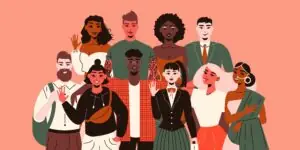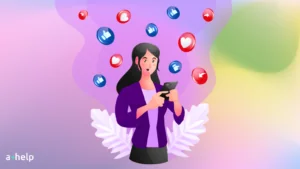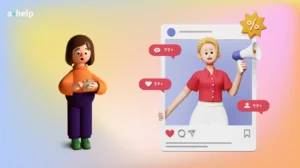With the emergence of Facebook, the way people communicate with each other changed forever. A social network allowing users to share the events of their lives through posting photos and status updates, to monitor the lives of their friends, and to communicate directly via a built-in messenger has revolutionized Internet communication, causing millions of people all over the world to share all kinds of information about themselves. There were, of course, other social networks before Facebook, but none of them garnered such a significant user base, remained as persistent, and continued to act as an effective form of communication as much as Facebook did. Along with Facebook, currently there are many other social networks, each with their own features and purposes; what unites them all, though, is the idea of sharing. Seemingly, this should positively impact the communication skills of users, since it allows communication even for people far away from each other, or who are unable to communicate live. However, there have been numerous research studies proving the opposite: social media platforms not only impair a user’s ability to share thoughts, but distort communication processes, creating more problems than they solve.

✅ AI Essay Writer ✅ AI Detector ✅ Plagchecker ✅ Paraphraser
✅ Summarizer ✅ Citation Generator
Speaking of the positive effects of social networks, they lie on the surface. According to surveys, 39% of respondents reported feeling closer to their friends because of social media, while 26% of the sample felt that they had more friends because of social media (NR Media). Facebook, Twitter, LinkedIn, and other similar services make daily communications between family members, friends, and business partners easier, more accessible, and independent of circumstances, such as distance. Communities existing on such platforms unite people sharing similar interests or concerns, and allow the representatives of various cultural backgrounds to reach each other with no constraints. Helping strangers meet and enabling initial communication between them—this is what social networks are definitely good for. Besides, they also allow to exchange experiences and knowledge. People can discuss their views on any topic: from specific ones, like their online essay writing service review, to a very broad one, like philosophy or politics.
At the same time, numerous research studies prove that social media platforms negatively affect people’s social skills. Probably the most alarming phenomenon connected to the extensive use of social media services is the decrease in quality of interpersonal communication. One of the big problems in modern interpersonal communication is the lack of interest people have for face-to-face communication; even today, there are many people (especially millennials, or younger) who prefer to solve work or personal problems via social messaging systems. Approximately 93 percent of communication today is already nonverbal, and thus requires an additional means of helping people understand each other (such as smileys or emojis), since text does not convey the total palette of intonations or facial expressions. This brings up several problems; for example, without these means, it is often more difficult to understand another person in a messenger system (the classical “he/she did not insert smileys, so I thought he/she is mad at me”); or, in real life, it may become harder to differentiate and understand real emotions. According to some experts, even families prefer texting over face-to-face chat. All this leads to difficulties in professional and personal relationships (Rampages.us).
Substituting real life experiences and events with Facebook-format online updates is another problem. Studies show that about 11 percent of adults prefer to stay at home on weekends and make posts on Facebook about how much fun they are having, instead of going out and acquiring real-life experiences. According to Hussein Chahine, the founder of the service Yazino, “Communication is constantly evolving. Some people are as used to seeing their friends’ online avatar as they are their face […] People increasingly prefer quick and frequent engagement with instant updates on news than a prolonged chat and are also finding new ways to catch up with friends from the comfort of their sofa.” Mark Clennon, a graduate of the University of South Florida, says that “People tend to want to show others that they are having fun than actually having fun themselves […] There’s a greater desire to share with other people you barely know, than actually hanging out with friends and making memories” (USA Today College). This is directly connected to another problem: “Facebook depression.” Generally speaking, it is the sense of inferiority occurring when people (teenagers, mostly) compare their real lives to the lives of their Facebook friends—based on the posts these friends make online—completely missing out on the fact that what they see is not necessarily true (NYBH). As a result, an interesting and alarming phenomenon emerges: many people sit at home, busy creating visibility of living fulfilled, happy lives, and suffer when they see how fulfilled the lives of other people are—who, in their turn, sit at home, busy creating visibility of living fulfilled, happy lives. This is a poignant example of a vicious circle.
Yet another impairment of communication skills caused by the extensive use of social media platforms is the impoverishment of language. Using messengers, people often use shorthand and shortened versions of words in order to type and deliver their messages as quickly as possible. However, such means of communication are much less effective than conventional ones (or rather, traditional, since contractions, slang, and abbreviations such as “brb,” “u r,” “m8,” “dunno,” and so on have already become almost conventional), and people getting used to them can experience difficulties in real-life interpersonal communication (Rampages.us). This is not to mention illiteracy, which is already becoming a scourge of this generation communicating through messengers.
Although social media may help people establish initial contact and aid people in uniting into groups under certain interests, they also cause a number of problems. In particular, nonverbal communication is gradually becoming one of the dominant forms of interpersonal interaction, negatively affecting people’s ability to deal with personal contact and meet the reactions and emotions of other people in real life. A significant percent of adults (up to 11 percent) prefer staying at home and communicating via their devices rather than going out and acquiring real-life experiences. This, along with “Facebook depression” and the overall impoverishment of language and communication skills, is alarming, and requires adequate and timely measures.
*Note: To ensure accurate and consistent citations in your Assignment Changes Essay Sample or any other text on “The Effects of Social Media on Communication Skills,” consider using a citation machine. This tool can help you format your references according to the required style guide.
Works Cited
Reider, Carson. “How is Social Media Affecting Our Communication?” NRMedia.biz. N.p., n.d. Web. 27 Apr. 2017.
“The Negative Impacts of Social Media on Face-to-Face Interactions.” Rampages.us. N.p., n.d. Web. 27 Apr. 2017.
“Viewpoint: Why Social Media is Destroying Our Social Skills.” USA Today College. Gannett Satellite Information Network, 18 July 2014. Web. 27 Apr. 2017.
“The Impact of Social Media Use on Social Skills.” New York Behavioral Health. N.p., n.d. Web. 27 Apr. 2017.
Follow us on Reddit for more insights and updates.





Comments (0)
Welcome to A*Help comments!
We’re all about debate and discussion at A*Help.
We value the diverse opinions of users, so you may find points of view that you don’t agree with. And that’s cool. However, there are certain things we’re not OK with: attempts to manipulate our data in any way, for example, or the posting of discriminative, offensive, hateful, or disparaging material.